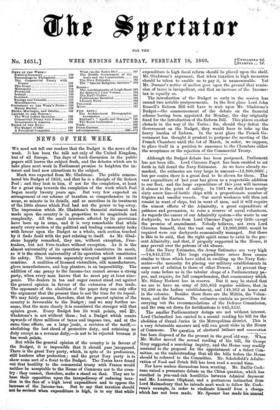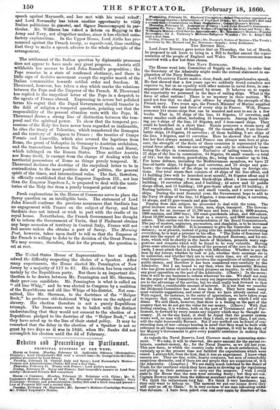Although the Budget debate has been postponed, Parliament has not
been idle. Lord Clarence Paget has been enabled to set forth_ in full detail the Navy Estimates. As we have already re- marked, the estimates are very large in amount-12,800,0001. ; but per contra there is a great deal to be shown for them. The vast expenditure of last year has given us a respectable addition to our fleet, and the large expenditure of this year will increase it almost to the point of safety. In 1861 we shall have nearly sixty sera line-of-battle ships with a proportionate number of frigates and smaller vessels. Our naval weakness will then not consist in want of ships, but in want of men, and it will require the utmost efforts of the Admiralty, a great expenditure of patience and persuasion, to raise a reserve of naval volunteers. As regards the cancer of our Admiralty system—the waste in our dockyards, we have from Lord Clarence Paget very little except the promise of amendment. Nobody believes, not even Lord Clarence himself, that the vast sum of 12,800,0001. would be required. were our dockyards economically managed. But there is this to be said, that the right spirit seems to exist in the pre- sent Admiralty, and that, if properly supported in the House, it may prevail over the patrons of old abuses.
Like the Navy Estimates, the Army Estimates are very high —14,842,2751. This large expenditure arises from causes similar to those which have aided in swelling up the Navy Esti- mates—the necessity for placing our military establishments in some sort of relation to those of other Powers. At present they only come before us in the tabular shape of a Parliamentary pa- per, and require, for full comprehension, that commentary which Mr. Sidney Herbert has in reserve. But it may be stated that we are to have an army of 235,852 regular soldiers, that I is 92,490 on the Indian establishment, and 143,362 at home and in the colonies. Besides these there are the Militia, the Volun- teers, and the Marines. The estimates contain no provisions for carrying out the recommendations of the Defence Commission, and the sum set down for fortifications is 645,355/.
The smaller Parliamentary doings are not without interest. Lord Chelmsford has carried to a second reading his bill for the abolition of Grand Juries in the Metropolitan district, This is a very debateable measure and will run great risks in the F49114 of Commons. The questfoh of electoral bribery and OAranIntiah
has been disposed of for the present in the good old way. When Mr. Mellor moved the second reading of his bill, Sir George Grey suggested a searching inquiry, and the House very readily assented to the proposal for the appointment of a Select Com- mittee, on the understanding that all the bills before the House should be referred to the Committee. Mr. Scholefield's Adulte- ration of Food and Drink Bill has been read a second time.
Nor have useless discussions been wanting. Mr. Baillie Coch- rane raised a premature debate on the China question, which has resulted in pen-and-ink hostilities between Admiral Seymour and Mr. Laurence Oliphant, and a portentous intimation from Lord Malmesbui7 that he intends next week to follow Mr. Coch- rane's example, in order to vindicate himself from a charge which has not been made. Mr. Spooner has made his annual
speech against Maynooth, and has met with his usual rebuff ; and Lord Normanby has taken another opportunity to vilify Italian politicians in general, and Signor Bnoncompagni in par- ticular. Mr. Williams has raised a debate on flogging in the Army and Navy, not altogether useless, since it has elicited satis- factory explanations. In the Upper House Lord Airlie has pro- nounced against the French treaty, as regards coal, thus enabling Earl Grey to make a speech adverse to the whole principle of the arrangement.



























